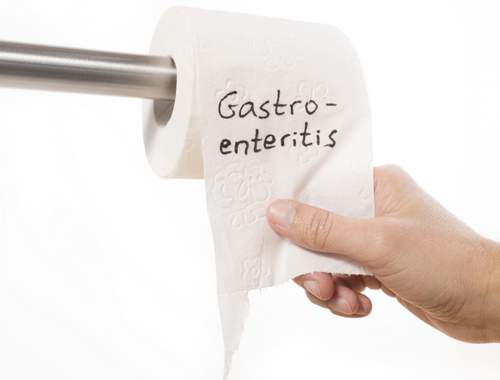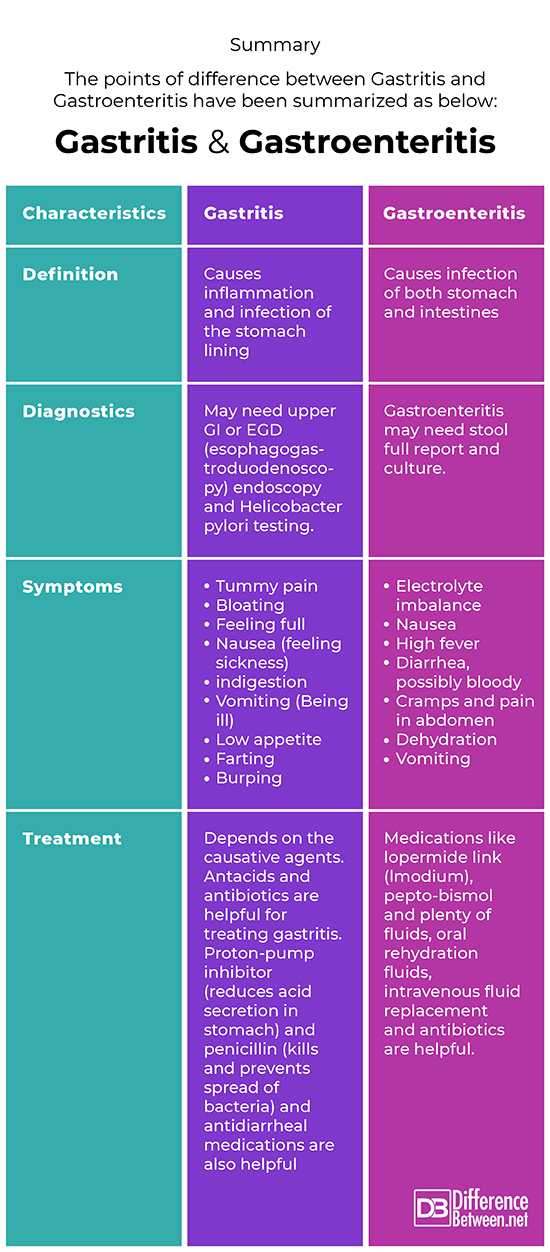Difference Between Gastritis and Gastroenteritis

What is Gastritis and Gastroenteritis?
Gastritis is inflammation of the gastric mucosa, stomach lining with acid irritation whereas Gastroenteritis is the inflammation of the GI tract, intestine, the stomach, and the bowel. It is possible to have acute or chronic gastritis. Acute gastritis occurs suddenly and usually goes away on its own. Chronic gastritis condition happens gradually and may require medical intervention.
Often referred to as stomach flu, gastroenteritis is a short-term condition that usually resolves on its own.

Similarity
Both cause infection of the digestive system.
Gastritis
It is defined as a collection of conditions characterized by inflammation of the stomach’s lining. The inflammation cause is usually the bacteria that is responsible for causing ulcers in stomach and the regular usage of pain relievers.
Gastroenteritis
Gastroenteritis is an infection of the gastrointestinal tract that can produce intense abdominal pain and profuse diarrhea. The causes or organisms like the rotavirus, salmonella, and cholera. It is usually transmitted through certain foods or water not containing toxins and by contact with fecal matter.
Difference between Gastritis and Gastroenteritis
Definition
Gastritis
It is defined as a condition in which the lining of the stomach is inflamed.
Gastroenteritis
It is also termed as tummy bug, food poisoning, stomach flu or viral enteritis. It is a viral or bacterial infection accompanied by diarrhea, nausea, vomiting, and cramps and is caused by infective organisms like Rota virus, Shigella, Salmonella, Cholera, etc.
Symptoms
Gastritis
The main symptoms of acute gastritis are: stomach pain or discomfort a feeling of fullness during or after eating, bloating, indigestion, belching, and heartburn.
Gastroenteritis
The main symptoms of gastroenteritis are: diarrhea, stomach pain, fever, nausea and headache. These symptoms sometimes result in dehydration. So, it is important for a person with gastroenteritis to stay hydrated.
Causes
Gastritis
Gastritis is caused by a variety of elements; from infection to weakened stomach lining due to nonsteroidal anti-inflammatory drugs such as aspirin and ibuprofen. The most common culprit is Helicobacter pylori (H. pylori) bacteria which may be spread through contact with saliva, vomit, or faeces, or even contaminated food and water. Other causes include smoking, stress, an unhealthy diet high in fats, sugars, and spices, as well as excessive consumption of alcohol.
Gastroenteritis
Gastroenteritis Infections caused by viruses, bacteria, and parasites are the second most common form of infections in the United States. Norovirus infections tend to cause it and it is highly contagious. People can get the infection from contaminated food or water or from coming into contact with someone who has it. Food poisoning is commonly referred to as bacterial gastroenteritis. Bacterial gastroenteritis tends to develop after consuming contaminated food or water.
Treatment
Gastritis
This condition can be treated with improving bad food habits, getting rid of pomp proton inhibitors, antacids and other risk factors
Gastroenteritis
Gastroenteritis is treated with rehydration therapy (a type of fluid replacement used to prevent and treat dehydration), and antibiotics in some cases.
Symptomatology
Gastritis
Burning epigastric pain
Gastroenteritis
Diarrhea (loose and watery stools) and cramping and pain in abdomen.
Summary
The points of difference between Gastritis and Gastroenteritis have been summarized as below:

FAQ
Can gastritis turn into gastroenteritis?
Symptoms of gastroenteritis and gastritis are different, and they affect different parts of the digestive system. Therefore, one cannot cause the other.
What are the warning signs of gastritis?
The warning signs are when the symptoms of gastritis are severe like stomach discomfort, heartburn, loss of appetite, nausea and vomiting, vomiting of blood (in cases of erosive gastritis), weight loss (more common with chronic gastritis), fever (rarely due to serious infection) and an unusual feeling of fullness in the stomach area as well as feeling full too quickly after eating.
What are the symptoms of gastroenteritis?
The main symptoms of gastroenteritis are: diarrhea, stomach pain, fever, nausea and headache. These symptoms sometimes result in dehydration. So, it is important for a person with gastroenteritis to stay hydrated.
What are the two types of gastritis?
Gastritis can be classified as erosive or non-erosive. With erosive gastritis, the stomach’s protective lining is inflamed, and over time, it erodes.
What helps gastritis go away?
Acid blockers can be prescribed or purchased over-the-counter, including famotidine (Pepcid), cimetidine (Tagamet HB), and nizatidine (Axid AR). An antacid is a medication that neutralizes stomach acid. Your doctor may prescribe one as part of your drug regimen. Antacids relieve pain quickly and neutralize stomach acid.
Why do I suddenly have gastritis?
Gastritis can be acute or chronic. Acute gastritis happens all of a sudden and is triggered by an injury, bacteria, viruses, stress, or ingesting irritants such as spicy foods, alcohol, or NSAIDs, and steroids. Chronic gastritis occurs gradually and can last for years.
- Difference Between Global Warming and Greenhouse Effect - May 18, 2024
- Difference Between Vaccination and Immunization - March 3, 2024
- Difference Between Selective Mutism and Autism - February 25, 2024
Search DifferenceBetween.net :
Leave a Response
References :
[0]Azer, S. A., & Akhondi, H. (2022). Gastritis. StatPearls [Internet].
[1]Bányai, K., Estes, M. K., Martella, V., & Parashar, U. D. (2018). Viral gastroenteritis. The Lancet, 392(10142), 175-186.
[2]Glickman, J. N., & Antonioli, D. A. (2001). Gastritis. Gastrointestinal endoscopy clinics of North America, 11(4), 717-740.
[3]Elliott, E. J. (2007). Acute gastroenteritis in children. Bmj, 334(7583), 35-40.
[4]Rugge, M., Pennelli, G., Pilozzi, E., Fassan, M., Ingravallo, G., Russo, V. M., & Di Mario, F. (2011). Gastritis: the histology report. Digestive and Liver Disease, 43, S373-S384.
